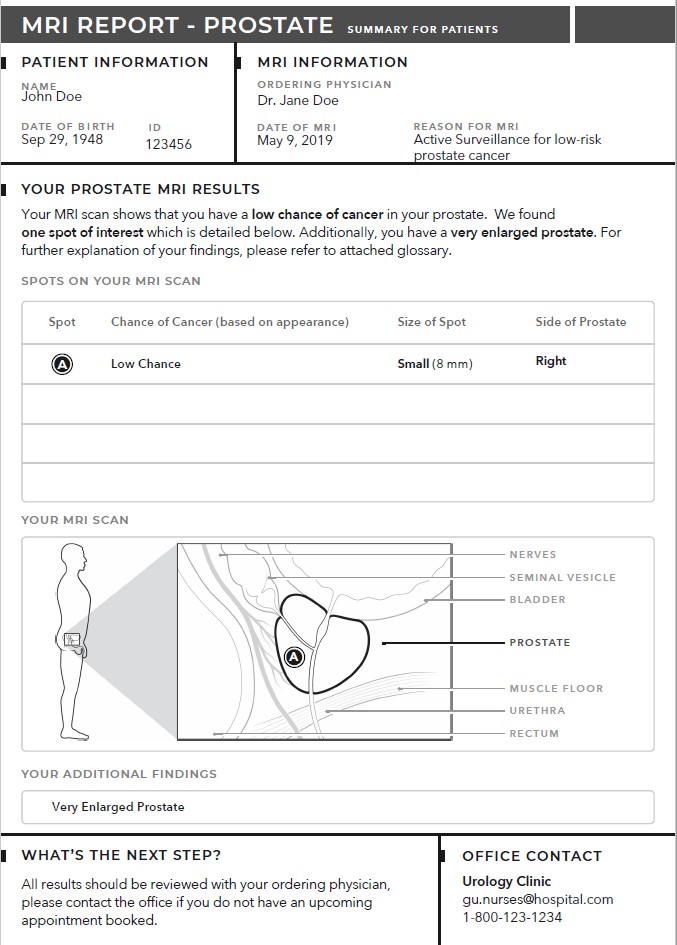Back
Poster, Podium & Video Sessions
Moderated Poster
MP16: Health Services Research: Quality Improvement & Patient Safety I
MP16-10: Exploring the Value of Using Patient-oriented MRI Reports in Clinical Practice
Friday, May 13, 2022
4:30 PM – 5:45 PM
Location: Room 228
Nathan Perlis, Antonio Finelli, Mike Lovas, Alexis Lund*, Amelia DiMeo, Katherine Lajkosz, Alejandro Berlin, Janet Papadakos, Sangeet Ghai, Dominik Deniffel, Eric Meng, David Wiljer, Shabbir Alibhai, Vasiliki Bakas, Adam Badzynski, Odelia Lee, Joseph Cafazzo, Masoom Haider, Toronto, Canada

Alexis Lund, MPH,BS
Clinical Research Coordinator
University Health Network
Poster Presenter(s)
Introduction: Standard radiology reports (SRR) are designed to communicate information between doctors. With many patients having instantaneous access to SRRs on patient portals, interpretation without guidance from doctors can cause anxiety and panic. We designed a patient-centred prostate MRI template report (PACERR)(Figure 1) to address some of these challenges and tested whether PACERRs improve patient knowledge and experience.
Methods: Patients booked for clinical prostate MRI were randomly assigned to SRR or SRR + PACERR. Questionnaires included multiple-choice that targeted 4 domains (understanding, usefulness, next steps, emotional experience) hypothesized to improve with patient-centred reports and short answer questions, testing knowledge regarding MRI results. Clinical encounters were observed and recorded to explore whether adding PACERR improved communication. Likert scaled-responses and short-answer questions were compared using Mann-Whitney U test and Kruskal-Wallis test.
Results: Of the 40 participants, the majority were MRI naïve (70%). Patients receiving a PACERR had higher scores in the categories of patient understanding (mean: 4.17 vs. 3.39, p=0.006), usefulness (mean: 4.58 vs. 3.07, p<0.001), and identifying next steps (mean: 1.89 vs. 3.03, p=0.003) but not emotional experience (mean: 4.18 vs. 3.79, p=0.22). PACERR participants found the layout and design more patient friendly (mean: 4.47 vs. 2.61, p<0.001) and easier to understand (mean: 4.37 vs. 2.38, p<0.001). In the knowledge section, overall, the PACERR arm scored better (87% vs. 56%, p=0.004).
Conclusions: Using a patient-reported version of a prostate MRI report in clinical practice improves the patient experience by empowering them to better express themselves and comprehend their results. Patients report better interaction with their medical professionals. Further works needs to be done to educate physicians on applying PACERRs to clinical practice. The generalizability of PACERRs is limited, thus future work should be directed toward automation from traditional reports.
Source of Funding: Dr. Perlis reports from Canadian Urological Association Scholarship Foundation (CUASF) - Early Investigator Research Scholarship, during the conduct of the study.


Methods: Patients booked for clinical prostate MRI were randomly assigned to SRR or SRR + PACERR. Questionnaires included multiple-choice that targeted 4 domains (understanding, usefulness, next steps, emotional experience) hypothesized to improve with patient-centred reports and short answer questions, testing knowledge regarding MRI results. Clinical encounters were observed and recorded to explore whether adding PACERR improved communication. Likert scaled-responses and short-answer questions were compared using Mann-Whitney U test and Kruskal-Wallis test.
Results: Of the 40 participants, the majority were MRI naïve (70%). Patients receiving a PACERR had higher scores in the categories of patient understanding (mean: 4.17 vs. 3.39, p=0.006), usefulness (mean: 4.58 vs. 3.07, p<0.001), and identifying next steps (mean: 1.89 vs. 3.03, p=0.003) but not emotional experience (mean: 4.18 vs. 3.79, p=0.22). PACERR participants found the layout and design more patient friendly (mean: 4.47 vs. 2.61, p<0.001) and easier to understand (mean: 4.37 vs. 2.38, p<0.001). In the knowledge section, overall, the PACERR arm scored better (87% vs. 56%, p=0.004).
Conclusions: Using a patient-reported version of a prostate MRI report in clinical practice improves the patient experience by empowering them to better express themselves and comprehend their results. Patients report better interaction with their medical professionals. Further works needs to be done to educate physicians on applying PACERRs to clinical practice. The generalizability of PACERRs is limited, thus future work should be directed toward automation from traditional reports.
Source of Funding: Dr. Perlis reports from Canadian Urological Association Scholarship Foundation (CUASF) - Early Investigator Research Scholarship, during the conduct of the study.



.jpg)
.jpg)